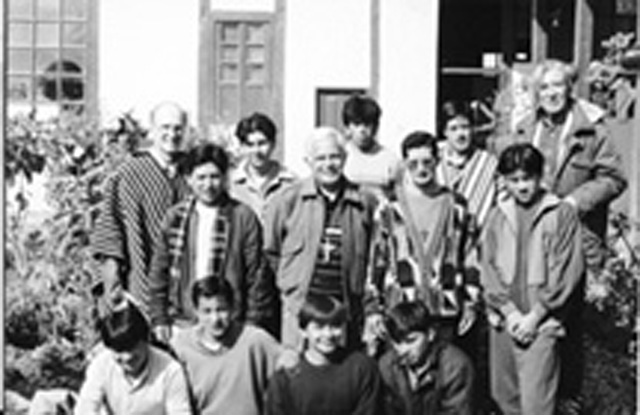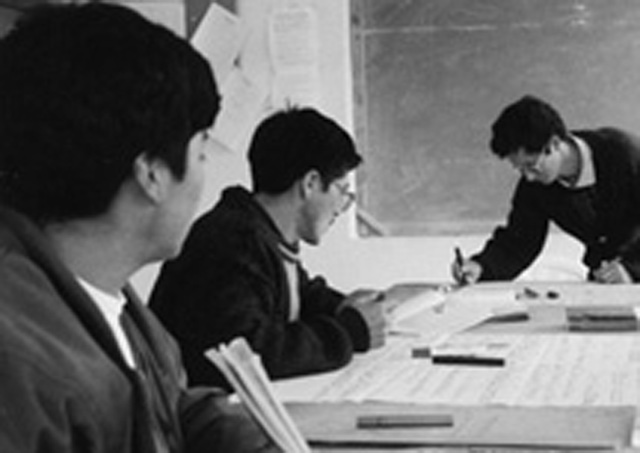GOOD NEWS TO THE POOR
By Fr. Frank Hegel, SFM
January/February 2001
Return to Table of Contents
Print Article
 (CREDIT: Jeaninne Wellens)
(CREDIT: Jeaninne Wellens)In front of Christ he Good Shepherd Seminary, established for young men from poor rural communities in the Diocese of Riobamba who wish to respond to Jesus’ call and dedicate their lives to establishing the Reign of God among their own people. Far left is Scarboro missionary Fr. Frank Hegel, director of the seminary; at centre is Bishop Victor Corral, bishop of the dkocese. Back Row, far right is Christopher David, a great supporter and friend.
Riobamba is the poorest diocese in one of the poorest countries of the world. Located in the province of Chimborazo, in the mountainous Andes of Ecuador, the diocese has a population of 400,000. Sixty-seven percent are Indigenous peoples. Their native language is Quichua. Sixty-three percent live in small, often isolated communities which cling to the sides of the valleys among a patchwork of fields, over 10,000 feet above sea level.
Ninety-one percent of the Indigenous live at subsistence level and 60 percent in extreme poverty with no health care, old age or any type of pension. Their homes are either shacks or one-room mud huts with thatched roofs and no windows.
In May of 1997 I was shown into the darkness of one such home. As I bent low to get in the door, chickens scattered in all directions. More than half the hut was occupied by a double-size bunk bed. Two families and several children lived here among the chickens.
Many of the round huts, three or four metres in diameter, are homes for extended families. In the community I visited, one grandmother had a shed for herself but she shared it with a cow. Another hut, smelling heavily of smoke and full of pots and firewood, had pieces of smoked meat hanging from a beam and a single massive bed. Four people slept there under the smoke-blackened thatched roof. There is no undressing. They only take off their outer garments, ponchos and shawls, to sleep.
BISHOP VICTOR CORRAL KNOWS THAT HE NEEDS PRIESTS FROM AMONG THE RURAL COMMUNITIES. IN 1997, A START WAS MADE.
The Quichua Indians are a gentle people, dark haired, bright eyed, with shining white teeth. They are small but can carry heavy loads on their heads and backs. They wear hats and brightly coloured ponchos and smile readily. You meet them on every dusty mountain track, the children struggling with pigs, sheep or heavily laden donkeys, all trekking to market to sell their goods. On Sunday they walk for miles from the villages, many barefoot, and pack the churches. But many communities are without a priest and without Mass.
The bishop of the diocese, Bishop Victor Corral knows he needs priests from among the rural communities. In 1997, a start was made. Four young men, trained as catechists, completed their secondary education and began a two-year philosophy course. And so began the Christ the Good Shepherd Seminary located in the town of Chambo, seven kilometres from Riobamba. To house the seminary, the men themselves restored a once fine but long-derelict church building sitting on an acre of land.
 (CREDIT Jeannine Wellens)
(CREDIT Jeannine Wellens)Scarboro missioner Fr. Frank Hegel celebrates Mass in the chapel of Christ the Good Shepherd Seminary, Riobamba, Ecuador. Fr. Frank has been the director of the seminary since its beginnings in 1997.
Today, there are 10 young men studying for the priesthood. A four-year course ends in ordination to the diaconate, after which the deacons work in parishes for a year before being ordained to the priesthood. A new wing has been recently added to accommodate the increased number of students.
There are also three married men studying at the seminary to become permanent deacons. These three come each day to attend classes. As well, an Xaverian missionary priest (Yarumal), Fr. Gerardo Nieves, has been appointed full-time assistant director. He is Ecuadorian, being born and raised in the city of Cuenca before joining the Yarumal Missionaries.
The seminary has been a vision and a dream. Without help from outside the diocese, it would be impossible. Bishop Victor Corral has made himself a champion of the Indigenous and it was his great joy to ordain the first Indigenous priest of the diocese in December, 1996. The priest had studied at the seminary in Quito, the capital. Bishop Corral needs many more priests.
Return to Table of Contents
Print Article
